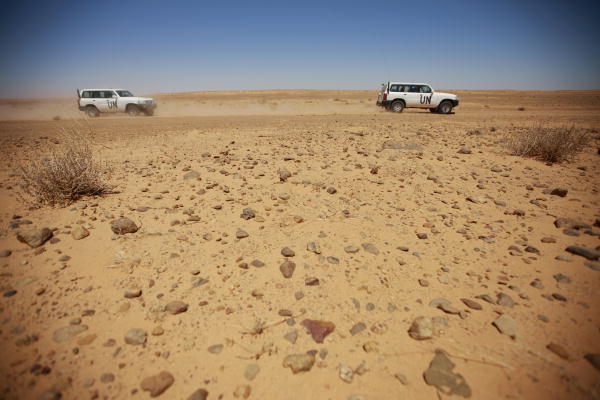Updated
Why the Western Sahara Matters | The Journal of International Security Affairs

Western Sahara. Photo: United Nations
In an article published in the Journal of International Security Affairs, American Enterprise Institute scholar Michael Rubin makes the case for Morocco’s autonomy plan:
Diplomats naturally seek compromise, but win-win situations only work when both sides sincerely seek a settlement. Had the referendum enshrined in the MINURSO mission been viable, it would have long ago occurred. Boiler-plate language for direct negotiations between Morocco and the Polisario are meaningless if not counterproductive when one party filibusters a permanent, realistic solution. With AQIM wreaking havoc in the region, and the Islamic State looking at North Africa and the Sahel as a new front, the United States and its European and African allies should no longer sit idle and let the problem fester. Washington should embrace stability and security, not take them for granted.
It is time to side unequivocally with Rabat. Morocco has been a staunch friend to the United States for centuries, ever since becoming the first country to recognize American independence in 1777. It is time to repay the favor. The United States should overtly recognize Moroccan sovereignty over the Western Sahara so long as Morocco fully implements its regionalization policy and utilizes the commodity and fishing resources of the region as well as potential offshore gas primarily for the development of the region, as required by international law. The ineffectual MINURSO experiment should be ended as an expensive artifact of the past. Rather than persist in a process that effectively holds Sahrawis in Tindouf hostage to the Polisario, the United States and United Nations should demand that Algeria allow Sahrawi refugees to travel with their families freely, by bus, to Morocco. No longer should the Polisario be allowed to keep family members hostage to encourage the return of the few camp residents who can get seats on UN-sponsored flights. Not always do American security interests and humanitarian factors so neatly coincide. In this case, however they do.
As crises erupt across the globe, from the Senkaku Islands to Ukraine and across the Middle East, it can be tempting for the White House and State Department to put policy toward traditionally peripheral regions like the Western Sahara on autopilot. It would also be a mistake, as the status quo in the Sahel is no longer tenable. [full story]